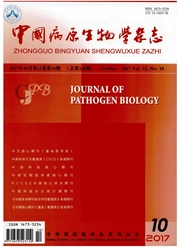

 中文摘要:
中文摘要:
目的探讨检测抗日本血吸虫三磷酸甘油酸脱氢酶(Sj GAPDH)抗体IgG诊断血吸虫病的价值。方法收集血吸虫现症感染患者治疗前、后不同时间点的血清及其他寄生虫病患者血清。以纯化的重组Sj GAPDH蛋白为抗原建立检测抗Sj GAPDH抗体IgG的常规酶联免疫吸附试验方法(Sj GAPDH ELISA)及生物素-亲和素信号放大酶联免疫吸附试验方法(Sj GAPDH BA ELISA),同时对收集的血清标本进行抗Sj GAPDH抗体IgG检测,并与检测抗SEA抗体IgG的SEA ELISA结果作比较,评价检测抗Sj GAPDH抗体IgG用于血吸虫病诊断与疗效考核的价值。结果 Sj GAPDH ELISA和Sj GAPDH BA ELISA检测79份现症感染血吸虫患者血清抗Sj GAPDH抗体IgG的敏感性分别为54.43%和91.14%,差异有统计学意义(P〈0.05%);特异性分别为93.85%和92.31%,差异无统计学意义(P〉0.05%)。Sj GAPDH ELISA检测患者在治疗后6个月血清特异性抗体阴转率为44.19%,治疗后12个月阴转率达53.49%。Sj GAPDH BA ELISA检测患者治疗后6个月血清特异性抗体阴转率为5.55%,治疗后12个月阴转率为9.72%。患者血清中抗SEA抗体IgG治疗后6和12个月均阳性。结论 Sj GAPDH蛋白在患者体内诱导短寿抗体反应,检测患者血清中的抗Sj GAPDH特异性抗体IgG水平及其在治疗前、后的变化具有一定的诊断与疗效考核价值。
 英文摘要:
英文摘要:
Objective To explore the value of detecting IgG antibodies against glyceraldehyde-3-phosphate dehydrogen- ase of Schistosoma japonicurn (S japonicum GAPDH) in order to diagnose schistosomiasis. Methods Sera were col- lected from patients with schistosomiasis at different times before and after treatment, and sera were collected from pa- tients with other parasitic diseases. The purified recombinant protein Sj GAPDH was used to establish a conventional en- zyme-linked immunosorbent assay (S} GAPDH ELISA) and ELISA with biotin-avidin signal amplification (Sj GAPDH BA ELISA) to detect lgG antibodies against S. japonicum GAPDH. The two methods were used to detect levels of IgG antibodies against S. japonicum GAPDH in sera from patients with schistosomiasis at different times before and after treatment. IgG antibodies against SEA were measured using SEA ELISA as a control. The results of the two methods were compared by assessing their diagnostic value and effectiveness at detecting IgG antibodies against S. japonicurn GAPDH. Results In 79 patients with schistosomiasis, Sj GAPDH ELISA detected serum IgG antibodies against S. japonicum GAPDH with a sensitivity of 54.43% while Sj GAPDH BA ELISA detected those antibodies with a sensitivity of 91.14%. Sj GAPDH ELISA had a specificity of 93.85% while Sj GAPDH BA ELISA had a specificity of 92.31%. Sj GAPDH BA ELISA had a markedly higher level of sensitivity than that of Sj GAPDH ELISA (P〈〈0.05%) but the twomethods had a similar level of specificity. Sj GAPDH ELISA indicated that 44.19% of sera tested negative for antibodies 6 months after treatment and that 53.49% of sera tested negative 12 months after treatment. Sj GAPDH BA ELISA indi- cated that 5.55% of sera tested negative for antibodies 6 months after treatment and that 9.72% of sera tested negative 12 months after treatment. Sera tested positive for IgG antibodies against SEA 6 months and 12 months after treatment. Conclusion S. japonicurn GAPDH induces a short-lived antibody response in the body.
 同期刊论文项目
同期刊论文项目
 同项目期刊论文
同项目期刊论文
 Monitoring specific antibody responses against the hydrophilic domain of the 23 kDa membrane protein
Monitoring specific antibody responses against the hydrophilic domain of the 23 kDa membrane protein Detection of the circulating antigen 14-3-3 protein of Schistosoma japonicum by time-resolved fluoro
Detection of the circulating antigen 14-3-3 protein of Schistosoma japonicum by time-resolved fluoro Characterization of IgG responses of rabbits to Sj14-3-3 protein after experimental infection with S
Characterization of IgG responses of rabbits to Sj14-3-3 protein after experimental infection with S 期刊信息
期刊信息
